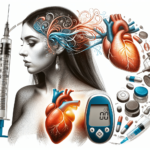Living with diabetes can be challenging enough, but for women, there is an added layer of complexity. The stigma and misunderstandings surrounding diabetes can prevent women from feeling empowered and in control of their health. This article aims to shed light on these issues and provide strategies for overcoming the stigma, empowering women with diabetes to lead fulfilling lives. So, if you’re a woman living with diabetes or someone who wants to support and understand them better, this article is for you.

This image is property of images.pexels.com.
In This Article
ToggleUnderstanding Diabetes
What is diabetes?
Diabetes is a chronic metabolic disorder that affects the body’s ability to regulate blood sugar levels. It occurs when the pancreas does not produce enough insulin or when the body cannot effectively use the insulin it produces. Insulin is responsible for controlling the amount of sugar in the blood and converting it into energy. Without proper insulin function, blood sugar levels can become dangerously high, leading to various complications.
Types of diabetes
There are several types of diabetes, the most common being type 1, type 2, and gestational diabetes.
Type 1 diabetes is an autoimmune condition where the body’s immune system mistakenly attacks and destroys the insulin-producing cells in the pancreas. This type usually develops in childhood or adolescence and requires lifelong insulin therapy.
Type 2 diabetes occurs when the body becomes resistant to the effects of insulin or when the pancreas does not produce enough insulin to meet the body’s needs. It is usually associated with lifestyle factors such as obesity, sedentary behavior, and poor dietary choices.
Gestational diabetes develops during pregnancy and affects a woman’s ability to control blood sugar levels. Although it typically resolves after childbirth, women who have had gestational diabetes are at a higher risk of developing type 2 diabetes later in life.
Prevalence of diabetes in women
Diabetes is a growing public health concern globally, and women are not immune to its impact. In fact, the prevalence of diabetes is increasing at an alarming rate among women. According to the International Diabetes Federation, approximately 199 million women are living with diabetes, and this number is expected to rise to 313 million by 2040.
Several factors contribute to the increased prevalence of diabetes in women, including hormonal changes throughout the life cycle, such as puberty, pregnancy, and menopause. Additionally, social and cultural factors, such as gender inequalities, limited access to healthcare, and disparities in education and income, can further exacerbate the risk of developing diabetes in women.
Stigma and Misunderstandings
Social stigma surrounding diabetes
Unfortunately, diabetes is often surrounded by social stigma and misunderstandings. People with diabetes may face discrimination, judgment, and stereotypes due to the misconceptions and myths surrounding the condition. This stigma can lead to feelings of shame, guilt, and isolation, making it difficult for individuals to manage their diabetes effectively.
Myths and misconceptions about diabetes
There are numerous myths and misconceptions about diabetes that perpetuate the stigma associated with the condition. Some common myths include the belief that diabetes is caused by eating too much sugar, that people with diabetes cannot eat certain foods, or that only overweight individuals can develop diabetes. These misperceptions often result in blame and judgment toward those living with diabetes, causing them to feel misunderstood and unsupported.
Impact of stigma on women with diabetes
The stigma and misunderstandings surrounding diabetes can have a particularly detrimental impact on women. Women already face unique challenges related to their health and well-being, and the added burden of diabetes stigma can further compound these difficulties. Women with diabetes may feel ashamed or embarrassed about their condition, leading to reduced self-esteem and a reluctance to seek necessary medical care or support. The emotional toll can be significant, affecting their mental health and overall quality of life.
Challenges Faced by Women with Diabetes
Emotional and psychological impact
Managing diabetes is not just about physical health; it also takes a toll on a person’s emotional and psychological well-being. Women with diabetes often experience heightened stress, anxiety, and depression due to the demands of managing their condition and the fear of potential complications. The constant monitoring of blood sugar levels, medication regimes, and lifestyle modifications can be overwhelming, leaving women feeling emotionally drained and vulnerable.
Barriers to self-care
Self-care is essential for managing diabetes effectively, but women can face various barriers that make it challenging to prioritize their own well-being. Household and caregiving responsibilities, career demands, and societal expectations often leave women with little time or energy to devote to self-care activities like exercise, meal planning, and regular medical check-ups. Additionally, financial constraints, lack of accessible healthcare, and limited awareness of self-care strategies can further hinder women’s ability to take control of their diabetes management.
Gender-specific challenges
Women with diabetes face unique challenges related to their gender. For instance, pregnancy with diabetes requires careful planning and management to ensure both the mother’s and baby’s health. Hormonal changes during the menstrual cycle can affect blood sugar control, necessitating adjustments to medication and lifestyle. Menopause brings its own set of challenges, as fluctuating hormone levels can impact blood sugar regulation and increase the risk of heart disease. It is crucial for women to have a thorough understanding of these gender-specific challenges to effectively manage their diabetes throughout different stages of life.
Empowering Women with Diabetes
Education and awareness
Empowering women with diabetes begins with education and awareness. Providing accurate and up-to-date information about the condition can help dispel myths, eliminate misunderstandings, and promote a more supportive environment. Women should be equipped with the knowledge and skills necessary to manage their diabetes effectively, enabling them to make informed decisions about their health and well-being.
Peer support and community engagement
Engaging in peer support networks and community groups can play a pivotal role in empowering women with diabetes. Connecting with others who share similar experiences can provide emotional support, practical guidance, and a sense of belonging. Peer support networks can offer a safe space for women to share their challenges, triumphs, and strategies for managing diabetes, fostering a sense of empowerment and motivation.
Access to healthcare and resources
Access to adequate healthcare and resources is vital for women with diabetes to effectively manage their condition. This includes regular medical check-ups, medication, monitoring equipment, and diabetes self-management education programs. Empowering women with diabetes involves ensuring that these resources are accessible, affordable, and tailored to meet their specific needs. Governments, healthcare systems, and communities must work together to remove barriers and create an inclusive healthcare environment for all women with diabetes.

This image is property of images.pexels.com.
Promoting Self-Care and Wellbeing
Importance of self-care
Self-care is crucial for women with diabetes to maintain their overall health and well-being. Prioritizing self-care activities helps manage blood sugar levels, reduce the risk of complications, and enhance quality of life. Engaging in regular exercise, following a balanced diet, getting enough sleep, and practicing stress management techniques are all essential components of self-care for women with diabetes.
Managing stress and mental health
Stress management is particularly important for women with diabetes, as stress can adversely affect blood sugar levels. Finding healthy coping mechanisms such as mindfulness exercises, meditation, yoga, or engaging in hobbies can help reduce stress and promote emotional well-being. Additionally, seeking professional support and counseling can be beneficial for women who may be struggling with anxiety, depression, or other mental health concerns related to their diabetes.
Healthy lifestyle choices
Maintaining a healthy lifestyle is a cornerstone of diabetes management. Women with diabetes should strive to engage in regular physical activity, choose nutritious foods, and maintain a healthy weight. Additionally, avoiding tobacco and excessive alcohol consumption can significantly reduce the risk of complications associated with diabetes. By making these healthy lifestyle choices, women can take control of their diabetes and improve their overall well-being.
Breaking the Silence
Sharing personal stories
Breaking the silence surrounding diabetes involves encouraging women to share their personal stories and experiences. By sharing their journeys, women can challenge the stereotypes and misconceptions associated with diabetes and inspire others facing similar challenges. Personal stories also provide a platform for advocacy, creating awareness, and fostering empathy and understanding in society.
Advocacy and activism
Advocacy and activism play a crucial role in empowering women with diabetes. Women with diabetes can advocate for themselves and others by raising their voices, demanding equal access to healthcare, and promoting policies that support diabetes management. By becoming advocates, women can influence change at a societal level and ensure that the needs of individuals living with diabetes are recognized and addressed.
Challenging stereotypes
Challenging stereotypes associated with diabetes is essential in breaking down stigma and empowering women. Educating society about the realities of living with diabetes, dispelling misconceptions, and promoting understanding can help eliminate the blame, shame, and judgment often experienced by women with diabetes. It is crucial to celebrate the achievements and resilience of women living with diabetes, showcasing their abilities and strengths beyond their condition.

This image is property of images.pexels.com.
Supportive Healthcare System
Compassionate healthcare providers
A supportive and compassionate healthcare system is vital for empowering women with diabetes. Healthcare providers who demonstrate empathy, understanding, and respect create a safe space for women to discuss their concerns, ask questions, and participate actively in their diabetes management. The establishment of a collaborative relationship between women and their healthcare providers is crucial in fostering self-confidence, motivation, and a sense of empowerment.
Holistic and patient-centered care
Holistic and patient-centered care is essential for addressing the unique needs of women with diabetes. This approach recognizes that women’s health encompasses more than just blood sugar control and requires a comprehensive evaluation of their physical, emotional, and social well-being. Healthcare providers should consider the impact of gender-specific factors, cultural beliefs, and socioeconomic status when developing individualized care plans for women with diabetes.
Accessible and affordable treatment
Availability and affordability of diabetes treatment and resources are essential for empowering women. Accessible healthcare facilities, affordable medications, insulin, monitoring equipment, and diabetes management education programs ensure that women can effectively manage their condition without experiencing financial burden or barriers. Governments, healthcare systems, and policymakers need to work together to ensure that affordable and quality diabetes care is accessible to all women.
Building Resilient Communities
Women’s empowerment initiatives
Empowering women with diabetes requires targeted initiatives that address their specific needs and challenges. Women’s empowerment programs can provide education, skills training, and support networks tailored to help women manage their diabetes effectively. By focusing on women’s empowerment, these initiatives foster resilience, confidence, and self-efficacy, enabling women to take control of their diabetes and lead fulfilling lives.
Creating safe spaces
Creating safe spaces within communities is crucial for women with diabetes. These spaces provide opportunities for women to connect, share experiences, and support one another. Support groups, community centers, and online forums can offer a sense of belonging and understanding, reducing the isolation and stigma often experienced by women with diabetes. Through these safe spaces, women can find solidarity, encouragement, and motivation to navigate their diabetes journey.
Community-based programs and workshops
Community-based programs and workshops are instrumental in empowering women with diabetes. These initiatives focus on educating individuals about diabetes prevention, management, and self-care strategies. By engaging women within their own communities, these programs promote awareness, empower women with knowledge, and encourage behavior change. Providing culturally relevant and gender-sensitive programs increases accessibility and participation, leading to improved health outcomes for women with diabetes.

Changing Public Perception
Raising awareness about diabetes
Raising public awareness about diabetes is crucial for dispelling myths and challenging stereotypes. Educational campaigns, social media initiatives, and community events can help reach a wider audience and promote accurate information about diabetes. By highlighting the realities of living with diabetes and showcasing diverse stories, the public perception can shift from judgment and blame to empathy and understanding.
Promoting empathy and understanding
Promoting empathy and understanding is key to combating diabetes stigma. Society must recognize that diabetes is a complex condition influenced by various factors, and individuals living with diabetes should not be blamed or judged. By fostering empathy, society can create a more supportive environment that encourages inclusivity, reduces stigma, and empowers women with diabetes to live their lives free from fear and discrimination.
Media representation and storytelling
Media representation and storytelling play a crucial role in shaping public perception. By portraying individuals with diabetes in a diverse and accurate manner, media can challenge stereotypes and break down the stigma associated with the condition. Feature stories, documentaries, and interviews can highlight the achievements, resilience, and everyday realities of women living with diabetes, fostering empathy and understanding across society.
Living a Fulfilled Life with Diabetes
Setting goals and pursuing dreams
Living a fulfilled life with diabetes begins with setting goals and pursuing dreams. Women with diabetes should strive to identify their passions, interests, and aspirations, and not let their condition limit their aspirations. By recognizing that diabetes is just one aspect of their lives, women can focus on their goals, build resilience, and overcome challenges, ultimately leading to a sense of fulfillment and satisfaction.
Celebrating achievements
It is important for women with diabetes to celebrate their achievements, no matter how small they may seem. Managing diabetes is a constant process that requires dedication and perseverance. By acknowledging their progress and accomplishments, women can boost their self-esteem, maintain motivation, and cultivate a positive mindset, further empowering them to continue their journey towards optimal diabetes management.
Inspiring others
Finally, women with diabetes have the power to inspire and support others facing similar challenges. By sharing their stories, offering guidance, and showcasing their resilience, women can motivate and empower others to take control of their diabetes and prioritize their health. Through their own experiences, women can become beacons of hope, instilling confidence, and reminding others that they are not alone in their journey.
Related posts:
 Empowering Self-Care: 90-Day Weight Loss Journal for Women with Motivational Food & Fitness Tracking
Empowering Self-Care: 90-Day Weight Loss Journal for Women with Motivational Food & Fitness Tracking
 Long-Term Health Concerns for Women with Diabetes
Long-Term Health Concerns for Women with Diabetes
 Managing Diabetes and Improving Sexual Health for Women
Managing Diabetes and Improving Sexual Health for Women
 The Importance of Regular and Thorough Foot Care for Women with Diabetes
The Importance of Regular and Thorough Foot Care for Women with Diabetes
 Managing the Stress of Constant Health Monitoring for Women with Diabetes
Managing the Stress of Constant Health Monitoring for Women with Diabetes
 Exercise routines for women with diabetes
Exercise routines for women with diabetes











No comment yet, add your voice below!